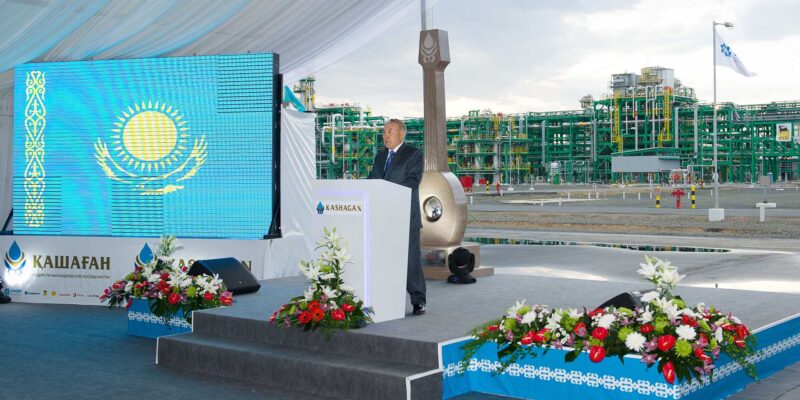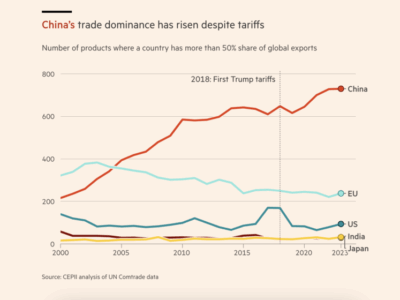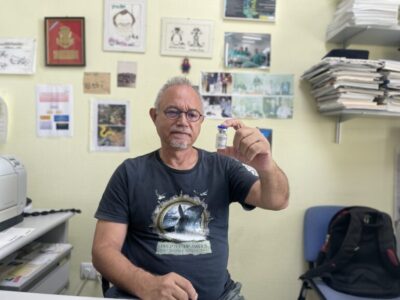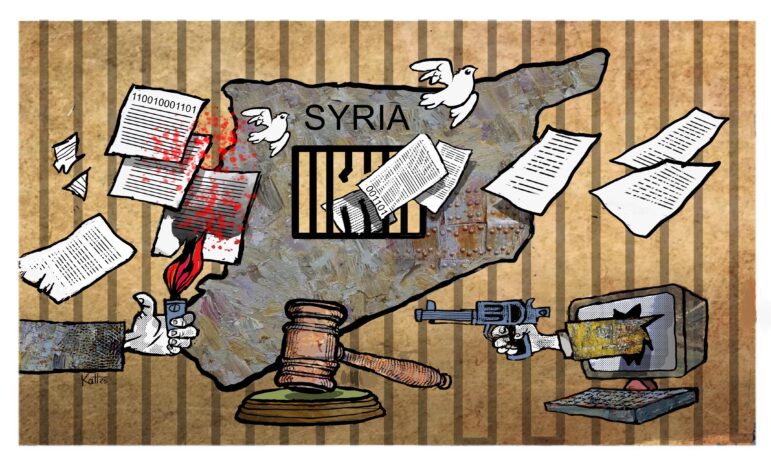
Kazakhstan is claiming that a group of international oil companies have been taking a staggering 98% of oil revenue, after modest royalty payments, from the country’s massive Kashagan oil field, according to a confidential interim ruling in a $160 billion arbitration claim seen by the International Consortium of Investigative Journalists.
The lopsided division of revenue, the Kazakh government asserts, stems from a production-sharing agreement to develop the incredibly complex Kashagan oil and natural gas field signed in 1997 between powerful oil companies and a fledgling Kazakh state, which had only recently emerged from the Soviet Union.
The deal was amended in 2008 to address the Central Asian country’s concerns over its fairness. But even the addition of royalties, known as priority payments, pushed up Kazakhstan’s share of revenue from Kashagan only a percentage point or so, an expert analysis said.
The Kazakh government’s stunning claim is mentioned in passing by an interim ruling in the arbitration, a copy of which has been seen by ICIJ. The ruling deals with an unrelated environmental fine levied against the oil companies’ consortium, the North Caspian Operating Company (NCOC).
“The Republic also submits that the amount of any potential fine must be viewed in context,” the ruling stated, “as the Contractor [NCOC] ‘currently receives 98% of all post-Priority Payment revenue from oil production.’”
The ruling is the first document to emerge from the ultra-secret arbitration case launched in 2023. It offers the most explicit look to date into the mega-claim brought by Kazakhstan against NCOC, whose shareholders include Shell, ExxonMobil, Eni, TotalEnergies, China National Petroleum Company, Japan’s Inpex and the Kazakh state energy company KazMunayGaz.
Kazakhstan has alleged that NCOC’s management of the long-troubled Kashagan project, which came online in October 2016, has led to billions of dollars in damages via lost profits, corruption and environmental violations, according to media reports.
Kashagan featured in ICIJ’s 2024 Caspian Cabals investigation as one of the three oil fields that feed the Caspian Pipeline Consortium (CPC).
The January 2025 ruling addresses a narrow claim involving the NCOC’s request to pause enforcement of a $5 billion fine imposed by Kazakh regulators for alleged environmental breaches at Kashagan. However, the ruling’s 39 pages hint at a wide-ranging and bruising dispute in which the 98% revenue figure appears as just one of a raft of claims and counter-claims.
NCOC shareholders Total and Eni have publicly pushed back on Kazakhstan’s arbitration claim, saying it does not have a “credible basis” and they are “united” to “fight” it. Other shareholders are yet to comment publicly. In the interim ruling, NCOC calls the $5 billion environmental fine a “naked cash grab.”
The landmark arbitration dispute marks a new, forceful approach by Kazakh President Kassym-Jomart Tokayev’s administration in dealing with NCOC after years of on-again, off-again tension between the oil majors and the previous administration of Nursultan Nazarbayev over years of delays at Kashagan. The field, located in the Caspian Sea, was once hailed as the biggest discovery since Alaska’s vast Prudhoe Bay, the largest oil field in North America.
In January, president Tokayev ordered the Kazakh government to push for extending existing production-sharing agreements with international energy companies, but on “better terms.”
Under those contracts, international companies front the money and expertise to develop often complex mineral reserves, before recovering the costs through the initial production period, and then finally sharing the profits with the host state. Kashagan — known for its tough operating environment, high reservoir pressures and high sulfur content — is estimated to have cost the oil majors at least $60 billion to develop.
The 98% revenue claim may hint at the crux of the arbitration dispute: the terms of the original 1997 production-sharing agreement for Kashagan, signed during the administration of former President Nazarbayev, have long been reported to favor the oil companies, even after revisions made in 2008. The agreement has never been published.
Energy Insight & Analytics (EXia), a Kazakh petroleum analyst firm, estimated in a report last year that between 2016 and 2023, Kazakhstan received $1.1 billion via the profit-sharing mechanism in the Kashagan agreement.
Overall, EXia said, Kazakhstan received more: $5.4 billion including oil sales, taxes, royalties and other payments from Kashagan in the period.
NCOC sold an estimated $55 billion worth of oil during this period, EXia calculated, noting that development and operation of Kashagan cost the international oil companies an estimated $86 billion.
“The percentage paid to NCOC from oil production looks massive, but it is in line with the contract that Kazakhstan signed,” said Paolo Sorbello, editor at independent Kazakh website Vlast.kz and an expert on Kazakhstan’s oil sector. “We should not forget that state-owned [oil and gas company] KazMunayGaz is a significant shareholder in NCOC and is therefore also earning revenues.”
Sorbello added that by pursuing the Kashagan arbitration, Kazakhstan risks alienating “some of its most trusted international corporate partners.”
“By lodging such a massive claim, despite clear contract terms, the Kazakh government could turn a generational oil find into an endless courtroom battle,” Sorbello told ICIJ. “On the other hand, NCOC shareholders should [come to] the negotiating table if they want to keep the relationship alive, not offer one-off payments hundreds of times smaller than what the government asks.”
International arbitration, a system of private courts that rose to the fore through a series of treaties in the 1960s and 1970s, is a commonly used means of settling sensitive commercial disputes in emerging markets, often between foreign investors and host states.
The details of proceedings conducted by tribunals, whose final awards are regularly worth billions of dollars, are shrouded in secrecy, as is the location of the arbitration. Decisions in these cases are not released unless both sides consent.
Kazakhstan’s claim was registered with the Permanent Court of Arbitration, founded in 1899 in The Hague, and is being heard by an arbitration tribunal in Geneva. The hearings are set to last until at least 2028.
The head of the government-created body representing Kazakhstan in the arbitration, known as the PSA, told Kazakh media in 2024 that the claim concerns “controversial issues which have built up over time,” and that their resolution will “introduce clarity over the future development” of Kashagan.
In a separate development, in March 2025, the PSA filed a civil complaint in Switzerland, claiming that alleged embezzlement schemes at Kashagan and another field, Karachaganak, were used to “bribe officials in Kazakhstan” and “remunerate certain Eni executives” and their intermediaries between 2006 and 2011, according to U.S court filings. The lawsuit is aimed at alleged intermediaries in the scheme and neither Eni nor NCOC are named as defendants. Eni did not respond to request for comment.
Sulfur stockpile dispute
The recent interim ruling addresses NCOC’s request to pause enforcement of a $5 billion fine levied in 2022 by Kazakh regulators over alleged sulfur permit breaches at Kashagan, where oil reserves have high sulfur content.
Kazakhstan has long stipulated that sulfur, a potentially hazardous byproduct of oil and gas refinement, and a key component of fertilizer, should not be stored in large blocks open to the air.
Instead, shareholders in the Kashagan project must transport their share of the sulfur byproduct from the field to sell on the global market.
NCOC has challenged the sulfur fine in the Kazakh courts, winning an appeal that was later overturned in favor of regulators. Kazakhstan’s Supreme Court is expected to make a final decision this year on whether the consortium did exceed its permits.
At its core, the dispute turns on how to interpret Kazakhstan’s system of annual permits for storing sulfur at Kashagan. It also gives a glimpse into the tensions at play within the broader arbitration.
Kazakhstan’s Ministry of Ecology has argued in the country’s courts that the annual permits apply to pre-existing stockpiles of sulfur, whereas the NCOC has argued the permits should only apply to sulfur produced the year they were issued.
NCOC has also said Kazakh authorities never suggested that the annual permit should be treated as a limit on the amount of sulfur held in storage, according to the interim ruling.
And yet, internal documents from Italian energy giant Eni, a 16.81% shareholder in Kashagan, suggest that the company may have previously agreed with the regulator’s interpretation.
An Eni presentation seen by ICIJ on “sulphur logistics” at Kashagan from early 2017 shows that the company calculated the potential fines if NCOC added to the existing sulfur stockpile from 2016 onward and violated annual sulfur permits.
“If sulphur is not removed from Kashagan field during years 2017 and 2018,” the Eni presentation reads, “then by end of 2018 Emission Permit will be exceeded by 1.4 [million] tons and [authorities] will impose severe penalties.”
A 2021 company directive from Eni also appears to acknowledge the permits were meant for the “continuation of storing … block sulphur.”
The directive said there was an “urgent need” to export the company’s sulfur stockpiles as there was a “growing risk” of environmental fines in light of moves to strengthen sulfur permitting regulations that year. Eni declined to comment when contacted by ICIJ.
According to the interim ruling in the arbitration, NCOC said two key factors were driving the build-up of sulfur at Kashagan: a delay in completing a crucial rail export link to transport sulfur, and alleged moves by regulators to “deliberately” block sulfur exports until August 2022. Neither Kazakhstan’s Ministry of Ecology nor the PSA responded to a request for comment.
Kazakh society is definitely not happy that the agreement for Kashagan, as well as the Tengiz and Karachaganak contracts, are not public. — journalist and Kazakhstan oil expert Paolo Sorbello
NCOC told ICIJ that its shareholders “consider that they have acted in accordance with the [Kashagan production sharing agreement], [the Republic of Kazakhstan’s] laws and applicable standards and best practices.” The company said it could not provide further details “due to the confidential nature of the [arbitration] proceedings.” Inpex, Shell and TotalEnergies declined to comment when contacted by ICIJ. CNPC, ExxonMobil and KazMunayGas did not respond to requests for comment.
NCOC told the arbitration tribunal that it had reduced the volume of stockpiled sulfur by half since 2022, and expected “the vast majority will have been eliminated by next year.”
The interim ruling ordered Kazakhstan to “take all measures necessary to prevent the enforcement” of the sulfur fine against NCOC, and recommended the sides refrain from actions that could “aggravate the dispute” during the ongoing arbitration.
President Nazarbayev’s resignation in 2019 after nearly 30 years in power opened a new chapter in the Kazakh government’s dealings with Western oil companies — not just over Kashagan but also Kazhakstan’s other major oil and gas fields, Tengiz and Karachaganak.
“Kazakh society is definitely not happy that the agreement for Kashagan, as well as the Tengiz and Karachaganak contracts, are not public,” said Sorbello. “People have been seriously advocating for transparency in that department. And so the Kazakh government’s 98% revenue claim talks to the ‘gut’ of the people.”















